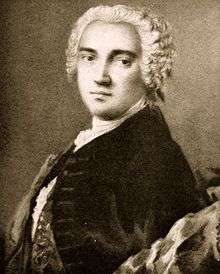Siroe (Hasse)
| Siroe | |
|---|---|
| Opera by Johann Adolph Hasse | |
 The opera's composer, Johann Adolph Hasse | |
| Librettist | Pietro Metastasio |
| Premiere |
2 May 1733 Teatro Malvezzi, Bologna |
Siroe, or Siroe re di Persia (Siroes, King of Persia), is an opera seria in three acts by Johann Adolph Hasse. The libretto was by Metastasio. As with many of the latter's libretti, Siroe was also set by Hasse's contemporaries, for example Vinci, Vivaldi and Handel (see his Siroe of 1728).
Performance history
Siroe was first performed on 2 May 1733 at the Teatro Malvezzi in Bologna. It was produced again in Naples at the Teatro di San Carlo on 4 November 1747.
Hasse was asked to reset the opera for the Elector of Saxony and this version was first performed on 3 August 1763 at the Grosses Königliches Opernhaus am Zwingerhof in Dresden.
Siroe received its modern-day premiere in an uncut version by Ensemble Serse in September 2008 in a performance which, including two fifteen-minute intervals, lasted just under five hours. Siroe was revived in an abridged form for the 2011 London Handel Festival by Ensemble Serse at St George's, Hanover Square in London on 15 April 2011 in a performance which lasted two and a half hours.[1][2] In 2018 the Nederlandse Reisopera staged performances in the Netherlands of a version lasting about 3 hours[3].
Roles
| Role | Voice type | Premiere cast, 2 May 1733[1] (Conductor: Hasse) |
|---|---|---|
| Cosroe, King of Persia | tenor | Filippo Giorgio |
| Siroe, older son of Cosroe | soprano castrato | Farinelli |
| Medarse, younger son of Cosroe | soprano castrato | Caffarelli |
| Emira, daughter of Asbite, King of Cambaya, and Siroe's lover | contralto | Vittoria Tesi |
| Laodice, Cosroe's mistress and Arasse's sister | soprano | Anna Maria Peruzzini |
| Arasse, Cosroe's general and confidante of Siroe | contralto | Elisabetta Uttini |
Synopsis
Medarse wishes to supplant Siroe as Cosroe's heir. Siroe is in love with Emira, daughter of Cosroe's former enemy Asbite, disguised as a man called Idaspe, while Siroe is loved in turn by his father's mistress Laodice. Eventually Cosroe recognizes the loyalty of Siroe and Emira, and makes Siroe the new king.
References
- 1 2 "Il Siroe". ensembleserse.com. Retrieved 14 November 2014.
- ↑ "Reviews". ensembleserse.com. Retrieved 14 November 2014.
- ↑ "Announcements". reisopera.nl. Retrieved 8 February 2018.
Other sources
- Amadeus Almanac (for 1733), accessed 11 February 2011
- Amadeus Almanac (for 1763), accessed 11 February 2011
- Brown, Howard Mayer (1992), 'Siroe (ii)' in The New Grove Dictionary of Opera, ed. Stanley Sadie (London) ISBN 0-333-73432-7
- Neville, Don (1992), 'Siroe re di Persia' in The New Grove Dictionary of Opera, ed. Stanley Sadie (London) ISBN 0-333-73432-7
External links
- Ensemble Serse review and historical notes, accessed 28 April 2011